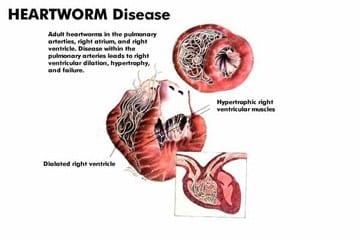Did you know April is National Heartworm Awareness Month? This is a serious and potentially life-threatening disease among pets that is caused by a parasite known as Dirofilaria immitis. Heartworms are foot-long worms that impact our furry friends heart, lungs, and blood. You might not recognize heartworms in pets initially until the adult worms have matured. As this disease advances, your dog may lose appetite, have difficulty breathing, and/or cough.
Sadly, a 2016 American Heartworm Society survey among 5000 veterinary clinics showed the number of heartworm positive pets rose 21% since 2013. What are some reasons we are seeing an increase in heartworm disease across the U.S. and what can we do to combat this life-threatening disease?
How to Prevent Heartworm in Dogs
The number one way we can minimize the incidence of heartworm disease is to increase compliance in administering preventatives. Monthly chewables like Heartgard, Interceptor, and Trifexis as well as monthly topical products like Revolution are extremely effective in preventing heartworm disease. With smart phone apps and email reminders from product manufacturers, there is no longer an excuse to forget to protect your pet. These products also control intestinal parasites that can be transmitted to humans like roundworm and hookworm, some whipworm species, and in the case of Revolution, fleas and ticks.
In addition, an injectable preventative called Proheart can be administered every 6 months by your veterinarian, making compliance a non-issue. These medications work in the dog’s system to kill circulating Stage 3 heartworm larvae, which are transmitted by a mosquito bite, before the parasite can mature into its adult form in the heart and pulmonary vessels.
Thus, a pill administered on May 1st works to kill larvae that may have entered your pet’s bloodstream via a bite up to 30 days prior. This is important to know, as many people stop giving heartworm preventative once the weather turns cool, not understanding they are treating for any infection acquired in the preceding month when mosquitoes may have been more active. Even “indoor” pets can be bitten by a mosquito entering the home from an open door or window and should receive a monthly, life-saving preventative.
Why do Dogs get Heartworm Disease?
A significant reason we are seeing an increase in heartworm infection is because of the changing temperatures that have extended mosquito breeding and feeding seasons. Standing water in pools, birdbaths, and ponds provide ample opportunity for mosquitoes to breed. Eliminating standing water or disrupting the water’s surface with fountains or aerators can limit mosquito populations. Keeping pets indoors during peak mosquito activity times can also reduce mosquito bites and disease transmission.
A surge in heartworm disease is also seen after natural disasters such as Hurricane Katrina; dogs are displaced, preventative care for pets is at a low due to expense and household disruption, and dogs carrying heartworm from the highly endemic South bring disease to areas where it was previously unheard of. Mosquitoes being the vector for transmission of the heartworm larvae, they bite the infected transplanted dogs and spread the blood-borne parasite via bites to previously uninfected dogs, cats, ferrets, coyotes, foxes, raccoons, and opossums.
Treatment Options For Heartworm
Cost to protect your pet from heartworm infection is about the same as your monthly Frappuccino and pastry. While dogs who test positive at their veterinarian’s office can often be successfully treated, the treatment can easily run in the thousands of dollars. Dogs are treated by administration of painful injectable medications, antibiotics, and preventative pills as well as subjected to diagnostic testing such as radiographs (X-rays), bloodwork, and urinalyses.
Treatment also involves strict exercise limitation for a period of several months which can be unbearable to an otherwise active young dog and owner. The “slow-kill” method to eliminate heartworm larvae and adults is not recommended.
The protracted method in which higher doses of preventative is given to eradicate heartworm adults and circulating microfilaria is variable in efficacy and can lead to heartworm parasite resistance. In cats, there is no way treatment to eliminate the parasite and they suffer from cough, lethargy, and sudden death.
In all species, with or without treatment and management, long term, irreversible damage is done to the heart, lungs, and sometimes organs such as the kidneys. Clearly, prevention is key to controlling heartworm disease in dogs.




